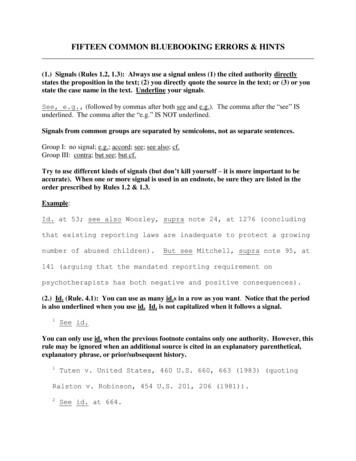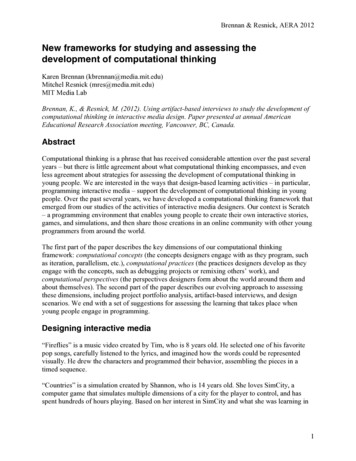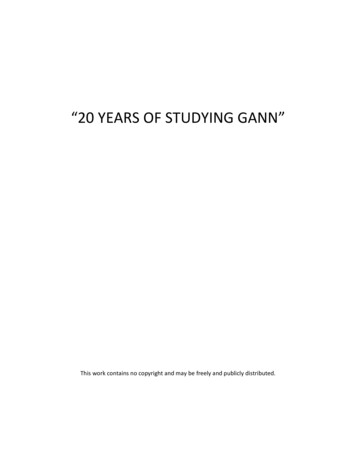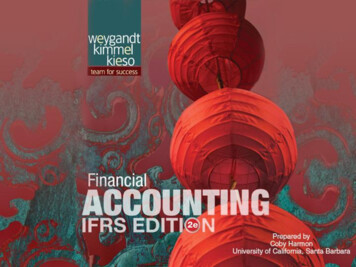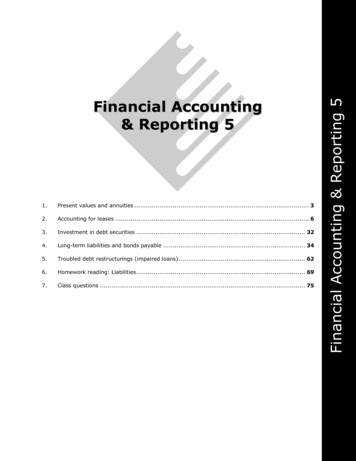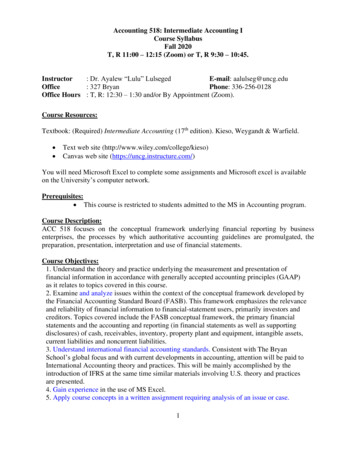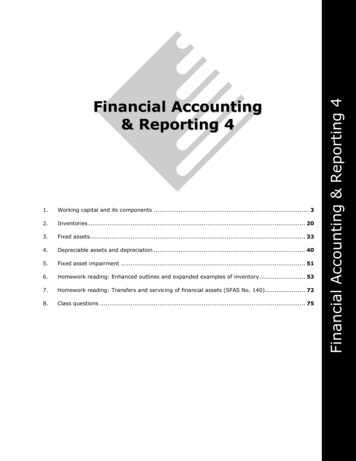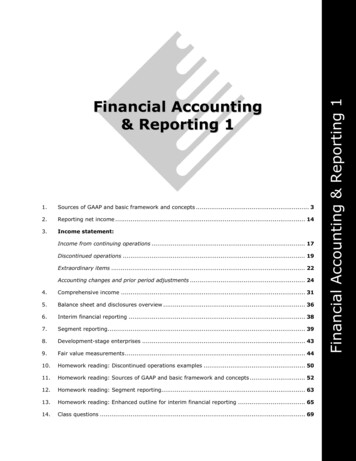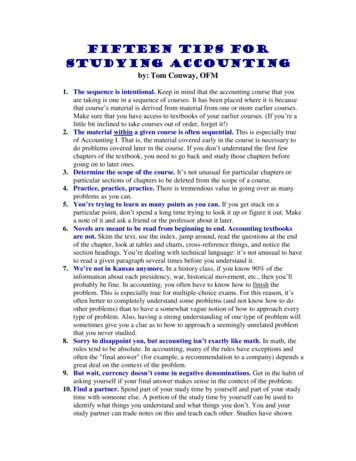
Transcription
Fifteen Tips forStudying Accountingby: Tom Conway, OFM1. The sequence is intentional. Keep in mind that the accounting course that youare taking is one in a sequence of courses. It has been placed where it is becausethat course’s material is derived from material from one or more earlier courses.Make sure that you have access to textbooks of your earlier courses. (If you’re alittle bit inclined to take courses out of order, forget it!)2. The material within a given course is often sequential. This is especially trueof Accounting I. That is, the material covered early in the course is necessary todo problems covered later in the course. If you don’t understand the first fewchapters of the textbook, you need to go back and study those chapters beforegoing on to later ones.3. Determine the scope of the course. It’s not unusual for particular chapters orparticular sections of chapters to be deleted from the scope of a course.4. Practice, practice, practice. There is tremendous value in going over as manyproblems as you can.5. You’re trying to learn as many points as you can. If you get stuck on aparticular point, don’t spend a long time trying to look it up or figure it out. Makea note of it and ask a friend or the professor about it later.6. Novels are meant to be read from beginning to end. Accounting textbooksare not. Skim the text, use the index, jump around, read the questions at the endof the chapter, look at tables and charts, cross-reference things, and notice thesection headings. You’re dealing with technical language: it’s not unusual to haveto read a given paragraph several times before you understand it.7. We’re not in Kansas anymore. In a history class, if you know 90% of theinformation about each presidency, war, historical movement, etc., then you’llprobably be fine. In accounting, you often have to know how to finish theproblem. This is especially true for multiple-choice exams. For this reason, it’soften better to completely understand some problems (and not know how to doother problems) than to have a somewhat vague notion of how to approach everytype of problem. Also, having a strong understanding of one type of problem willsometimes give you a clue as to how to approach a seemingly unrelated problemthat you never studied.8. Sorry to disappoint you, but accounting isn’t exactly like math. In math, therules tend to be absolute. In accounting, many of the rules have exceptions andoften the "final answer" (for example, a recommendation to a company) depends agreat deal on the context of the problem.9. But wait, currency doesn’t come in negative denominations. Get in the habit ofasking yourself if your final answer makes sense in the context of the problem.10. Find a partner. Spend part of your study time by yourself and part of your studytime with someone else. A portion of the study time by yourself can be used toidentify what things you understand and what things you don’t. You and yourstudy partner can trade notes on this and teach each other. Studies have shown
that by teaching others you ensure that you will recall the information later. Themost important rule about working with someone else: keep to the task! Workhard to keep to the subject at hand. Interrupt your partner when he/she startstalking about unrelated topics.11. Learn the vocabulary. There is no quicker tip-off to the professor that you don’tknow what you’re doing than using terminology inappropriately. (For example,the clueless student will typically sprinkle the term "money" liberally throughoutan essay while accounting textbooks seldom use the term.) Most accountingtextbooks have at least one glossary. Also, most textbooks put the key terms inboldface type. Do enough reading of the textbooks to understand how the authoruses each important term.12. Don’t be fatalistic. Yes, accounting is difficult. Yes, accounting is hard work.Yes, it takes time. No, it’s not impossible. Most good students report having somebreakthrough moments: times when suddenly a range of topics suddenly makesense. You might be closer than you think to having one of those breakthroughs.13. Develop a sense of curiosity. There are many rules in accounting which seem atfirst to be either contradictory or counterintuitive or both. Try to figure out whythe rule exists and talk to other people about it. The really good students treataccounting as one big puzzle-game which they expect to win!14. Take some satisfaction in the fact that you’re doing something difficult. Eventhough accounting is a very marketable skill, that’s not the best reason to study it.The best reason to study accounting is that it helps develop your ability to doanalytic thinking.15. Bad things happen. If nothing else motivates you to study, remind yourself thatit’s very possible to get a "D" or an "F" in an accounting course. This worst-casescenario plays itself out for some students every semester. Use this fact asmotivation when you are debating whether to study accounting or to go out forpizza.Source: www.siena.edu/advising/accttips.htm
*Tips for Studying Mathematics*Active Study vs. Passive StudyBe actively involved in managing the learning process, the mathematics and your studytime: Take responsibility for studying, recognizing what you do and don't know, andknowing how to get your Instructor to help you with what you don't know.Attend class every day and take complete notes. Instructors formulate testquestions based on material and examples covered in class as well as on those inthe text.Be an active participant in the classroom. Get ahead in the book; try to work someof the problems before they are covered in class. Anticipate what the Instructor'snext step will be.Ask questions in class! There are usually other students wanting to know theanswers to the same questions you have.Go to office hours and ask questions. The Instructor will be pleased to see thatyou are interested, and you will be actively helping yourself.Good study habits throughout the semester make it easier to study for tests.Take responsibility for keeping up with the homework. Make sure you find outhow to do it.You probably need to spend more time studying per week - you do more of thelearning outside of class than in High School.Tests may seem harder just because they cover more material.Take as much time as you need to do all the homework and to get completeunderstanding of the material.Form a study group. Meet once or twice a week (also use the phone). Go overproblems you've had trouble with. Either someone else in the group will help you,or you will discover you're all stuck on the same problems. Then it's time to gethelp from your Instructor.The more challenging the material, the more time you should spend on it.Studying for a Test Start by going over each section, reviewing your notes and checking that you canstill do the homework problems (actually work the problems again). Use the workedexamples in the text and notes - cover up the solutions and work the problemsyourself. Check your work against the solutions given. You're not ready yet! In the book each problem appears at the end of the section inwhich you learned how do to that problem; on a test the problems from differentsections are all together.
Step back and ask yourself what kind of problems you have learned how to solve,what techniques of solution you have learned, and how to tell which techniquesgo with which problems.Try to explain out loud, in your own words, how each solution strategy is used(e.g. how to solve a quadratic equation). If you get confused during a test, you canmentally return to your verbal "capsule instructions". Check your verbalexplanations with a friend during a study session (it's more fun than talking toyourself!).Put yourself in a test-like situation: work problems from review sections at theend of chapters, and work old tests if you can find some. It's important to keepworking problems the whole time you're studying. Also: Start studying early. Several days to a week before the test (longer for the final),begin to allot time in your schedule to reviewing for the test.Get lots of sleep the night before the test. Math tests are easier when you arementally sharp.Source: http://euler.slu.edu/Dept/SuccessinMath.html
How to Study for a Music Class Students should prepare a definition, description, and (or) explanation of everyname, title, or term discussed in class. In essence, each should follow the principleof "who, what, when, where". This definition, description, or explanation shouldinclude each of the following:1. Brief description—one or two sentences—of what the name, title, or termrepresents. (This might be the sort of thing found as the first few lines of adictionary entry for the name, title, or term. For a composer, this mustinclude the place of birth, and locations where the composer worked,visited, and lived.)2. A date, or span of dates, that applies for the name, title, or term. Thisshould be one or both of a specific date, or pair of dates, and an overallgeneral description, such as "early seventeenth century".3. An indication of the place, or places where the person or item was presentor active. This might include a city, a state, a country, and a continent, asappropriate.4. For terminology, an example of the item named as it normally appears inmusic notation.5. Examples of music, with dates, that represents the name, title, or term. Fora composer, this would be music composed by the composer; for aperformer, music performed by that performer. For terminology, thiswould be examples of music that use the item in question. Whenappropriate, the examples may be very specific, including not justparticular pieces, but also exact locations within individual pieces.Source: tu-tips.htm
Tips for Studying Biology Study Idea #1. Type out your notes.1. It eliminates visual distractions on the page. It makes your notes appear clean and,hopefully, concise.2. It forces you to re-visit the material. This is especially helpful when you have notreviewed the material for awhile. You will have an easier time when you eventually sitdown and try to memorize things, trust me.3. It produces a "self-test". When I sit down to type my notes, I often format them intotwo columns. One column is the "question" side, and one column is the "answer" side.This way I can cover up the "answer" column and test myself before the exam. Anotherformat I use when typing my notes is simply to write out the question, skip a few lines oftext, and then type out the answer. I quiz myself by trying to answer the questions on apiece of paper and then checking them with the typed answer.Study Idea #2.Use your artistic abilities.This idea is good for studying complex processes and detailed concepts. I start bybreaking down my complicated notes into little segments of information. Wheneverpossible I try to incorporate simple, bright illustrations. In creating these "minibillboards" of information, I am able to familiarize myself with the material withoutgetting overwhelmed by all the details. After I have come to understand the basicconcepts, I build on my knowledge and start memorizing the details. Typically, thismeans that I turn to note-cards or my typed notes to help with memorization. But visualaids are a great way to start tackling complicated information.Study Idea #3.You can learn a lot in 15 minutes.I take my notes everywhere and study them during all of life's "in-between" moments.These short study periods are helpful because the material is more familiar to me when Isit down at night to really concentrate on memorizing. A couple minutes here and thereeventually add up, and when you are pressed for time, these precious snippets ofstudying really count.Study Idea #4.Break things up.To help break up the material and the long periods of study time, I divide my typednotes into short packets of four or five pages each. Each day I try and learn thematerial of one packet. As my learning progresses, I review multiple packets in one studysession. To really learn the material, I normally plan out my study schedule so that I havetwo full days to review all of the material. This means that I have to start studying well
before the exam date, but I am able to walk into the classroom on the day of testingfeeling very confident with my knowledge of the material.Study Idea #5. It's all about the atmosphere.Find a place that is conducive to studying. This means: 1. You want to go somewherewhere you won't be interrupted. Sometimes this means getting away from webmail andtelephones and the like. 2. Make sure you have plenty of pencils and paper, and that youbring your textbook along to answer any questions that may arise during the course ofyour studying.Study Idea #6.Go to all the review sessions.This will work for you in multiple ways. First off. your professor will know that you areserious about learning the material. Secondly, they incorporate yet another way for you tofamiliarize yourself with the topics under study. Review sessions are also helpful for theobvious reason that they allow you the chance to ask questions concerning material thatstill is unclear to you. Finally, they allow you to hear the questions of others. This isimportant because other students may present questions that you never thought of. Ialways look at review sessions as an opportunity to "polish-up" on my knowledge of thematerial.Study Idea #7.Write down your questions and visit your professor during office hours.Professor's are often pressed for time, especially when an exam is near. When studying, Ikeep a running list of questions. I make note of concepts that are still unclear to me. Toanswer these questions and clear up my understanding of the material, I first consult mytextbook. If the textbook does not sufficiently cover my question, then I approach myprofessor during office hours. I bring the list of questions with me this way I am assuredthat all of my questions will be answered.Study Idea #8.Believe in yourself.If you have taken an active role in learning the material, then walk into the classroom onthe day of the exam with a smile. You prepared yourself well. Now is the chance to showyour professor how much you've learned.Source: http://biology.kenyon.edu/HHMI/Biol113/aboutme.htm
How To STUDY FOR ECONOMICS COURSESTAKING NOTES IN CLASS Before class: At least pre-skim related readings and review lecture notes from previousclass; look at problems in the study guide; make note of new terms, concepts, measures,models, graphs, and theories; formulate questions.During class: Have questions in mind as the lecture begins; adapt a format which allows awide left-hand margin for summarizing and editing your notes plus a narrow right-handmargin for recording your own insights, questions, etc.; be alert to assumptions underlyinghypotheses and note how hypotheses are tested against observational data.After class: Review and edit your notes; use the left-hand margin to summarize materialand list key terms; "test" yourself as soon as possible to recall lecture highlights.READING THE TEXT Preview the material: Look at sub-headings, graphs, questions at the end of chapter; notenew terms.Read actively: Formulate questions before you read (from lecture notes and preview) andthen read to answer those questions; translate abstract concepts to specific instances;know what every term and symbol means.Analyze graphs thoroughly: What "economic story" is being told?; what are theassumptions?; note units of measurement on each axis; note direction (positive ornegative) of the relationship.Recall: Test yourself immediately and cumulatively at the end of each section; then use acombination of marginal notations and underlining to summarize.Reflect: Set aside time to question and criticize what you've read — then make notes ofthose thoughts.PREPARING FOR EXAMS Integrate and review lecture and text notes; make a list of key topics, concepts, problems,theories, models, and terms.Review via ACTIVE RECALL rather than just passive re-reading.Re-work homework questions and workbook problems.Practice using the information in the form that will be required by the test format; predicttest questions and problems and practice answering them.Realize that various test questions will ask you to know, comprehend, apply, and analyzewhat you've studied.TAKING EXAMS Glance over the whole exam quickly, assessing questions as to their level of difficulty andpoint value; set time goals for each section accordingly.Begin to work the questions which are easiest for you; the others will be easier whenyou've "warmed up."Maximize partial credit possibilities by attempting all questions.Save time at end of exam for re-reading and editing.Analyze returned tests to prepare for future ones.Source: ts/1409.htmlPS
Tips on studying a foreign LanguageThough many students may feel they have a mental block or even lack the aptitude for learning foreignlanguages, most can learn a second language IF they are willing to put in the necessary time. Here are somepractical suggestions for studying effectively, overcoming anxiety, and learning the grammar and skillsnecessary for success in college foreign language classes.1.2.3.4.5.6.7.8.STUDY EVERY DAY. A foreign language course is different from any other course you take.Language learning is cumulative: you cannot put it off until the weekend. Study 1 or 2 hours forevery class hour if you want an A or B.DISTRIBUTE YOUR STUDY TIME in 15- to 30-minute periods throughout the day. Focus ona different task each time: vocabulary now, grammar next, etc. Get an overview during the firsthalf hour: spend 10 minutes reviewing dialog, 10 minutes learning new vocabulary, 10 minuteslearning new grammar . so you'll at least have looked at it all. Approximately 80% of your studytime should be spent in recitation or practice, including practice in the language lab.ATTEND AND PARTICIPATE IN CLASS WITHOUT FAIL — even if you are not wellprepared. Class time is your primary opportunity for practice. Learn the grammar and vocabularyoutside of class in order to make the most of class time. Spend a few minutes "warming up" beforeeach class by speaking or reading the language.MAKE YOURSELF COMFORTABLE IN THE CLASS. Get to know your classmates so youwill feel you are among friends. Visit your instructor during office hours to get acquainted:explain your goals and apprehensions about the course.LEARN ENGLISH GRAMMAR IF YOU DON'T ALREADY KNOW IT. Grammar is theskeleton of a language, its basic structure: you must learn it. Review a simplified English grammartext. Compare new grammatical structures in your foreign language to their English equivalents.PRACTICE FOR TESTS by doing what you will have to do on the test. If the test will requireyou to write, then study by writing — including spelling and accents. If you will be asked to listen,then practice listening. Ask for practice questions; make up your own test questions. Inventvariations on patterns and forms. Over-learn: study beyond the point of recognition to mastery.DEVELOP A GOOD ATTITUDE. Have a clear personal reason for taking the class. Setpersonal goals for what you want to learn. Leave perfectionism at the door; give yourselfpermission to make mistakes and learn from them.GET HELP IF YOU NEED IT. Talk with your teacher. Form study groups among classmembers. Use tutoring services. Don't wait!READING and WRITING a foreign language are analytical skills. You may be good at these if you are alogical person who attends to detail. Train yourself through practice to notice and remember details such asaccents and gender agreement.READING SKILLS TIPS: First, read the vocabulary list for the assignment. Next, read the questions over the reading. Thenread all the way through a new passage two or three times, guessing
Studying Accounting by: Tom Conway, OFM 1. The sequence is intentional. Keep in mind that the accounting course that you are taking is one in a sequence of courses. It has been placed where it is because that course’s material is derived from material from one or more earlier courses.File Size: 487KB
